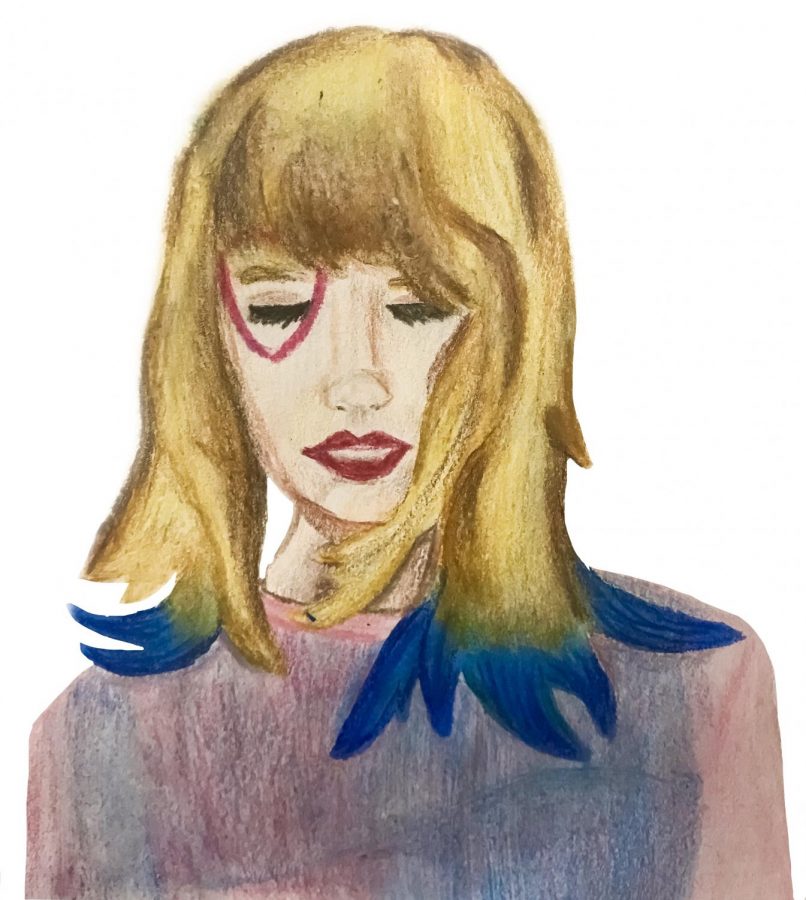Taylor Swift returns with “Lover”
October 8, 2019
Taylor Swift released her dreamy, pastel hued, seventh studio album “Lover” on Aug. 23. The album heavily lives up to its reputation as a “celebration of love,” a title deemed by Swift herself. The 18-track album echoes vibes from her most popular past albums such as “Red” (2012) and “1989” (2015) and mixes them with a deluge of electro pop beats to create a sanguine bubblegum-esque soundtrack that tells Swift’s heartfelt revelations about love throughout her music career.
After notoriously declaring the “old Taylor Swift” dead in her song “Look What You Made Me Do” (2017), it seems the new Taylor Swift has been revived as a person of growth and acceptance. Yet whether this growth is genuine or simply a facade for the sake of the album can be hard to distinguish in a couple of songs.
The album picks up where “Reputation” left off, speculated to be addressing her feud with Kanye West. The opening song, “I Forgot That You Existed,” is a reference to this fight; while the song emphasizes Swift’s newfound carefree positive attitude towards her critics, it also throws shade at West. Swift effectively gets so-called closure as she always does: writing a bashing song while lifting herself up. The use of this song as the opening sends mixed signals, and it is unclear what Swift’s true intentions are.
Furthermore, “Me!” featuring Brendon Urie, with its lavish rainbows and fantasylands, is an extremely forced method of expressing her uniqueness and gives off more Disney vibes than sophisticated growth.
Another such controversy arises with the release of “You Need to Calm Down” along with the music video, which depicts several LGBTQ+ celebrities dancing with Swift. The use of the lyrics, “A little shade never made anybody less gay” along with the music video ending with her and Katy Perry hugging, possibly signaling the end of a never-ending feud, equates the struggles of a marginalized community with those of a petty Internet war.
Yet, for the most part, from choruses of self love, odes to her beau, Joe Alwyn, and a tear-jerking reflection on dealing with her mother’s diagnosis of cancer, Swift readily covers all the bases as she takes on her new persona as “Lover.”
This explicit assertion of self-confidence and independence carries its voice loudly through the entire album. “The Man,” in particular, is her strongest response to critics who have attacked everything from her lengthy list of ex-lovers to her singing abilities: “They’d say I played the field before I found someone to commit to / They wouldn’t shake their heads / And question how much of this I deserve / What I was wearing, if I was rude / … / I’d be the man.”
By incorporating the double standard applied to female artists, Swift proves both her strength and maturity to give a truthful comeback.
Additionally, something that strongly stood out about this album was the continuation of this very confidence in her songs about love and maintaining a relationship. “1989” was known for its lust and grandeur of being with a man, with a lot of emphasis on physical sensations rather than feeling. On the other hand, ”Red” captured a young and experimental Swift who was often left heartbroken and bitter.
“Lover” perfectly voices a woman who reflects on former mistakes and past loves to explain her current relationship. The “it’s you, not me” attitude is gone. Swift admits that she has dislikable qualities but is still true to her personality and hopes that her significant other will accept these flaws like she has learnt to.
The title track “Lover” shifts away from the autotuned cacophony heard in “Reputation.” A soft guitar sound can be heard, reminiscent of the folk-pop sound from ”Red.” The imagery of a home depicted with “Christmas lights up ‘til January” and the unity in “This is our place, we make the call,” creates a comfortable and settled vibe. This emphasis on life as a couple is juxtaposed against Taylor Swift’s own reclamation of love, heard in the melodious repetitions of “You’re my, my, my, my lover.” Swift takes time to detract from the “we” and celebrate a feeling of happy possessiveness: there is a newfound sense of security in the lyrics missing from her previous odes to love.
Furthermore, Swift ironically accompanies the realities of a relationship with peppy R&B background music. While highlighting the power of love, the album simultaneously succeeds in refusing to enter the realm of glorification. The most prevalent way Swift communicates this message is through color imagery.
“Cruel Summer,” “Miss Americana and the Heartbreak Prince,” “London Boy” and “Afterglow” all make references to blue. While all of the songs contain a romantic interest and describe the pleasure of newfound relationships, the usage of blue varies between the different tracks.
In “Cruel Summer,” for example, Swift sings, “The shape of your body, it’s blue,” emphasizing the unfamiliarity and mystery of this new love. “Miss Americana and the Heartbreak Prince” takes a more negative spin on the hue, writing, “We’re so sad, we paint the town blue.” In “London Boy,” Swift reminisces the past, talking about the ever-famous “faded blue jeans” mentioned in old tracks such as “Tim McGraw.”
On the closing track “Daylight,” Swift sings, “I once believed love would be (burnin’ red),” a reference to her song “Red,” (2012). The shift from a passionate fire to a delicate gold illustrates Swift’s realization that love is “golden like daylight” as she continues to grow.
While the album has a few loud, overly explicit tracks that can be mistaken for insincerity, it is the thoughtful choice of lyrics and hidden Easter eggs that Swift drops throughout the album that epitomize the brilliance and genuineness of “Lover.”





